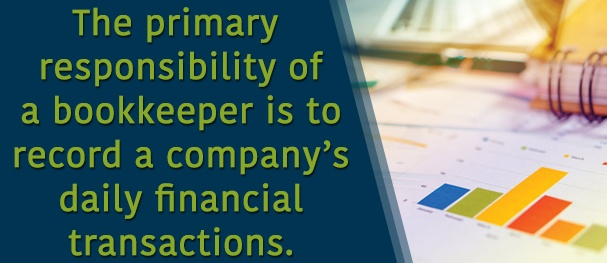Whether you sell baseball cards, baseballs, or tickets to a baseball game, your business still needs a bookkeeper or an accountant, or ideally, both.
Though bookkeeping and accounting are two terms frequently used interchangeably, they are different. A bookkeeper’s responsibilities are mainly transactional, gathering and entering financial transactions. By contrast, an accountant’s responsibilities are analytical and focus on financial performance, using that information to help you better manage your business.
While accounting software has played a huge role in automating the bookkeeping and accounting processes, it’s still helpful for small business owners to understand the similarities and differences between the two.
What is bookkeeping?
Bookkeeping focuses on the proper recording of financial transactions for your business. Usually, your bookkeeper would use double-entry accounting to record all your financial transactions. Double-entry accounting means that for every debit entry you make, a corresponding credit entry must be made.

A bookkeeper’s primary responsibility is recording daily financial transactions. Image source: Author
While they mainly record financial transactions, bookkeepers are responsible for a variety of duties, which are important for maintaining a successful business.
- Organize and categorize transactions: This includes reviewing incoming bills for accuracy and preparing them for payment.
- Write invoices: It’s impossible to get paid if your customers never receive an invoice. Bookkeeper responsibilities include tracking sales and writing invoices for goods and services provided.
- Pay bills: Small businesses need to maintain a good relationship with their vendors, which is why paying bills by their due date is so important.
- Record customer payments: Recording customer payments promptly ensures that your accounts receivable balance is accurate and that you don’t send a past-due notice to a customer when they’ve already paid.
- Maintain petty cash: With company credit cards, a petty cash account isn’t as important as it once was, but if your company still has one, it’s the bookkeeper’s job to ensure that the funds are managed and disbursed properly.
- Reconcile bank statements: An often overlooked task, regularly reconciling bank statements reduces potential errors and provides you with an accurate bank balance each month.
- Enter month-end adjusting entries: While bookkeeping software has reduced the number of journal entries needed, there are likely to be month-end adjusting entries needed to account for expenses such as depreciation, interest expenses, bank charges, and other items that may have been skipped.
- Prepare financial statements: While it’s the job of an accountant to analyze financial statements, it’s often the bookkeeper’s job to prepare financial statements on a monthly, quarterly, or annual basis, depending on company needs.
Bookkeepers can also be responsible for other tasks such as reviewing expense reports and assisting in preparing a budget. A bookkeeper’s job is an important element for any small business, and it shouldn’t be underestimated.
What is accounting?
Sometimes, the job of an accountant can overlap that of a bookkeeper. However, while the bookkeeper’s job is usually centered on transaction entry, the accountant’s is to analyze the information recorded by the bookkeeper, using accounting principles.

Accountants can tell you where your money is at all times. Image source: Author
The top accounting functions performed by accountants include the following:
- Preparing financial statements: While bookkeepers can run standard reports including financial statements, accountants typically run these reports, which include a balance sheet, an income statement, and a cash flow statement, along with any other reports deemed necessary. It’s also the accountant’s job to analyze the information in the financial statements, looking at items such as monthly expenses, monthly income totals, the amount of cash your business has on hand, and ways to improve business performance.
- Analyzing revenue and costs: Bookkeepers enter transactions, but it’s the accountant’s job to understand what they mean. This analysis can include everything from calculating accounting ratios to adjusting the general ledger. Accountants also look at historical data to spot trends, such as increasing expenses, decreasing revenues, or product profitability.
- Taxes: One of the best reasons to have an accountant on board is for tax purposes. While accountants can help with preparing tax returns, it’s what they bring to the table regarding tax deductions, tax planning, and ways to reduce tax liability that make them so valuable. We all have to pay taxes, but accountants can show you ways to reduce your annual tax bill.
- Financial planning: Accountants are trained to look at the big picture. While bookkeepers can spot trends, accountants can provide specific information and advice on how to bring in more revenue, cut expenses, and make your products more profitable, among other things. Accountants can also offer advice on things like business structure and expansion.
Bookkeeping vs. accounting: What are the main differences?
Bookkeeping and accounting are both essential to your small business. While both deal with financial transactions, bookkeeping centers on the organization and recording of financial transactions, while accounting analyzes those financial transactions and their impact on your business.
Both bookkeeping and accounting use the accounting equation Assets = Liabilities + Equity, considered the foundation of the double-entry accounting system.
But as similar as the two may appear, there are major differences.
| Bookkeeping | Accounting |
|---|---|
| Organizes and records financial transactions | Reviews financial statements and general ledger balances |
| Creates invoices and posts payments | Prepares adjusting and closing entries for bookkeepers |
| Reconciles bank statements | Runs accounting ratios to determine profitability, debt, and income |
| Is more concerned with day-to-day activity | Is more concerned with the big picture |
| Handles month-end closing | Handles all tax returns and tax planning |
| Runs financial statements | Creates forecasts and budgets |
Does your small business need a bookkeeper or an accountant?
Ideally, it would have both. Most small businesses can get by in the early stages using a bookkeeper, and that may be sufficient for managing day-to-day activity. In many cases, a skilled bookkeeper can perform many of the same tasks an accountant would. However, it’s always a good idea to have an accountant to review entries, look at cash flow, and provide any feedback on the performance of your business, including cost-cutting measures and other suggestions.
Bookkeeping and accounting are both important
While having an adequate bookkeeping system in place may be sufficient for many small businesses, it does not diminish the importance of an accountant.
There’s a place for both bookkeeping and accounting in your small business, and as a small business owner, you’ll likely be called upon to be both at one time or another. While accounting software certainly makes the bookkeeping process a lot easier, it requires a different set of skills and knowledge to handle accounting for your business.
In either case, familiarizing yourself with bookkeeping terms and accounting basics can certainly go a long way toward making the process easier.
Our Small Business Expert
We're firm believers in the Golden Rule, which is why editorial opinions are ours alone and have not been previously reviewed, approved, or endorsed by included advertisers. The Ascent, a Motley Fool service, does not cover all offers on the market. The Ascent has a dedicated team of editors and analysts focused on personal finance, and they follow the same set of publishing standards and editorial integrity while maintaining professional separation from the analysts and editors on other Motley Fool brands.